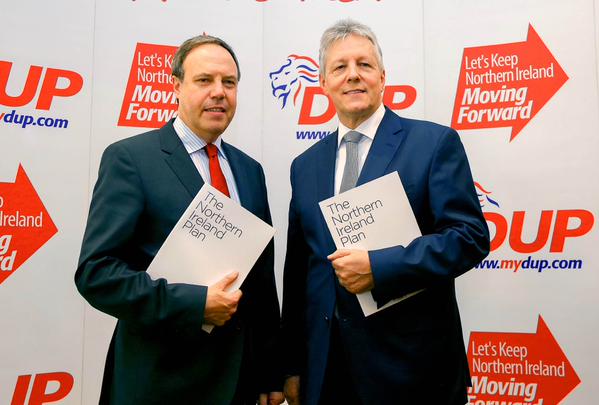The Ulster Paradox: Why do so many gay people in Northern Ireland vote DUP? (Opinion)
By Ross Semple

It’s now been a week since the UK’s shocking election result and Theresa May’s announcement that her proposed ‘strong and stable’ government would actually be a lame horse, propped up by the ten MPs from Northern Ireland’s Democratic Unionist Party.
It’s a scenario that has raised everything from eyebrows and wry smiles (perhaps even the odd exasperated chuckle), to complete indignation. For the first time, the DUP has been thrust firmly into the unforgiving limelight of mainstream British politics, and it’s showing up several truths that are proving unpalatable, particularly within the LGBT+ community.
As a gay man from Northern Ireland, I have been asking my mainland contemporaries where their passionate condemnation has been hiding. For decades, Northern Ireland – as much part of the UK as England, Scotland and Wales – has lagged behind the other three nations on gay rights. We were the last region to decriminalise gay sex in 1982 and, despite the UK’s first official same-sex civil partnership ceremony taking place in Belfast in 2005, have been struggling to legalise same-sex marriage. Northern Ireland is the only region of the British Isles (including the Irish Republic and the Isle of Man) to still not recognise it.
These struggles have been largely fought alone with little pressure from central government and nationwide equality groups, or any kind of mass public interest, to bring Northern Ireland in line with the rest of the UK. The DUP hasn’t come out of nowhere: they and their ultra-conservative Christian values have been influencing life in Northern Ireland for a very long time. But in my haranguing of the party’s new-found critics, I’m opening myself up to accusations of “traitor” and “hypocrite”, indeed two terms that have been hurled in my direction in the past week. For I, along with many LGBT+ people from Northern Ireland, have voted for the DUP.

What’s that I hear? Is it the sound of the comments section being flooded with a wave of outrage? I get it – how can a gay man who grew up believing that he needed to hide his sexuality, who believed that the politicians were right; how could he then turn around and vote for those very same politicians?
It’s a paradox that I and many others struggle with in ourselves. It’s a struggle we feel every time we shout in frustration at the TV as archaic views are being expressed in the Stormont parliament; when we march in Belfast’s Gay Pride, heads held high, only to be met by placards of protest and hate; and when we’re standing in the polling booth about to put an X next to DUP.
To understand why is to examine the complexities of Northern Irish politics, and given some of the comments and demonstrations I have seen since Theresa May’s announcement, it might be an understanding that only comes from living there.
What it boils down to is cultural allegiance. Northern Ireland may not be as cosmopolitan and secular as London or Manchester, but change is happening. Votes aren’t cast based on religious convictions. Few (although, admittedly, some) people will have gone into the booth to halt the terrible advancement of homosexuality (“think of the children!”). But what will have swayed most is the party’s stance on the union, on British culture, and on the protection of Protestant people. And believe me, these are things that people really do feel passionate about – I would even dare to suggest that a Pride march could be forgiven by even the staunchest of DUP supporters if it replaced a few Pride flags with Union Jacks.

There’s the question of the alternative, too. Those very values that send Protestants into the polling booths to vote for the DUP are the values they feel sustained attack after attack from IRA terrorism during the infamous Troubles. And who do some voters consider to be the political wing of the IRA? It’s Sinn Fein, the province’s second largest party. So, it’s fair to say that for some, a vote for the DUP is a vote against Sinn Fein and the IRA.
The more moderate parties (the Ulster Unionists, SDLP and Alliance) no longer hold much clout but, ironically, it is this bi-partisan element to politics in Northern Ireland that offers some hope. Twenty years ago, it would have been unthinkable that Sinn Fein and DUP might sit in the same room together, let alone govern in a power sharing parliament – and it would have been equally unthinkable that their respective supporters would have accepted it. But that’s exactly what happened.
Through effort, soul searching, and considerable gritting of teeth, both sides made huge strides in putting aside often insurmountable differences in order to govern Northern Ireland for the good of its people. The DUP in particular, populated by many who had been attacked or known someone who had been attacked by republican terrorists, made a virtual shift in official party policy by negotiating with Sinn Fein.
Anyone who grew up in Northern Ireland during the Troubles will tell you – if they’re capable of that, a change in attitude towards the LGBT+ community doesn’t seem so out of the question. One thing the gay rights cause has in common with Northern Irish politics is clear – mockery and aggression will not change minds, but mutual understanding can.
Words by Brian Campbell
